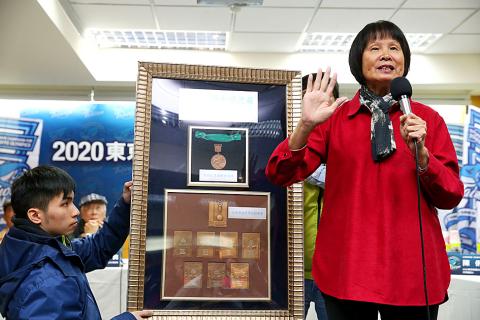Pro-independence groups yesterday renewed their call for a referendum to rename the national sports team from “Chinese Taipei” to “Taiwan” when participating in the Tokyo Olympics in 2020.
A coalition that includes the Taiwan Solidarity Union (TSU), the Social Democratic Party, World United Formosans for Independence, some Democratic Progressive Party (DPP) lawmakers and the Lee Teng-hui Association for Democracy urged the public to join the referendum initiative as part of a name rectification movement.
The nation’s athletes have participated in the Olympics under the names “Taiwan,” “Formosa” and “Republic of China (ROC),” but delegations also withdrew from some Games due to controversies over their titles until the term “Chinese Taipei” was adopted in 1981.

Photo: CNA
Taiwan is the only member of the International Olympic Committee (IOC) that is prohibited from using its name and national flag when participating in the Games, which is an insult to Taiwanese athletes, track and field Olympic medalist Chi Cheng (紀政) said.
Displaying the bronze medal she won at the 1968 Mexico Olympics, which the nation participated in under the name “Taiwan” after the IOC changed the name from “ROC” to avoid confusion with the Chinese delegation, Chi said the government was wrong when it decided not to participate under the name “Taiwan” in subsequent Games.
“The wrong decision has made us suffer this long and we are still fighting today to rectify Taiwan’s name,” she said.

Photo: CNA
Taiwan People News founder Chen Yung-hsing (陳永興) criticized the DPP administration, saying a referendum proposal would be unnecessary if the government took the initiative to rename the Chinese Taipei Olympic Committee (CTOC) as the “Taiwan Olympic Committee” and launch a renaming process with the IOC.
“The Taiwanese government is the one that has kept obstructing Taiwan. From [former president] Chiang Kai-shek (蔣介石) to the DPP, all of them have obstructed Taiwan,” Chen said.
New Power Party Legislator Freddy Lim (林昶佐) said during last year’s revision of the National Sports Act (國民體育法), his party had proposed renaming the CTOC something more neutral — the “National Olympic Committee” — but was rebuffed.
This suggested that the DPP administration is imposing limitations or restrictions on itself, Lim said.
DPP Legislator Pasuya Yao (姚文智) said he felt “ashamed” as “external disruption and political realities have forced us [the DPP] to put aside our political ideals.”
Yao called on the public to join the referendum drive and then pass a plebiscite with a record-setting approval level.
The TSU has collected 3,400 signatures for the proposal since February last year to give to the Central Election Commission.
Campaigners hope a referendum could be held in conjunction with the nine-in-one local elections at the end of this year, TSU Chairman Liu Yi-te (劉一德) said.

CHAOS: Iranians took to the streets playing celebratory music after reports of Khamenei’s death on Saturday, while mourners also gathered in Tehran yesterday Iranian Supreme Leader Ayatollah Ali Khamenei was killed in a major attack on Iran launched by Israel and the US, throwing the future of the Islamic republic into doubt and raising the risk of regional instability. Iranian state television and the state-run IRNA news agency announced the 86-year-old’s death early yesterday. US President Donald Trump said it gave Iranians their “greatest chance” to “take back” their country. The announcements came after a joint US and Israeli aerial bombardment that targeted Iranian military and governmental sites. Trump said the “heavy and pinpoint bombing” would continue through the week or as long

TRUST: The KMT said it respected the US’ timing and considerations, and hoped it would continue to honor its commitments to helping Taiwan bolster its defenses and deterrence US President Donald Trump is delaying a multibillion-dollar arms sale to Taiwan to ensure his visit to Beijing is successful, a New York Times report said. The weapons sales package has stalled in the US Department of State, the report said, citing US officials it did not identify. The White House has told agencies not to push forward ahead of Trump’s meeting with Chinese President Xi Jinping (習近平), it said. The two last month held a phone call to discuss trade and geopolitical flashpoints ahead of the summit. Xi raised the Taiwan issue and urged the US to handle arms sales to

State-run CPC Corp, Taiwan (CPC, 台灣中油) yesterday said that it had confirmed on Saturday night with its liquefied natural gas (LNG) and crude oil suppliers that shipments are proceeding as scheduled and that domestic supplies remain unaffected. The CPC yesterday announced the gasoline and diesel prices will rise by NT$0.2 and NT$0.4 per liter, respectively, starting Monday, citing Middle East tensions and blizzards in the eastern United States. CPC also iterated it has been reducing the proportion of crude oil imports from the Middle East and diversifying its supply sources in the past few years in response to geopolitical risks, expanding

Pro-democracy media tycoon Jimmy Lai’s (黎智英) fraud conviction and prison sentence were yesterday overturned by a Hong Kong court, in a surprise legal decision that comes soon after Lai was jailed for 20 years on a separate national security charge. Judges Jeremy Poon (潘兆初), Anthea Pang (彭寶琴) and Derek Pang (彭偉昌) said in the judgement that they allowed the appeal from Lai, and another defendant in the case, to proceed, as a lower court judge had “erred.” “The Court of Appeal gave them leave to appeal against their conviction, allowed their appeals, quashed the convictions and set aside the sentences,” the judges